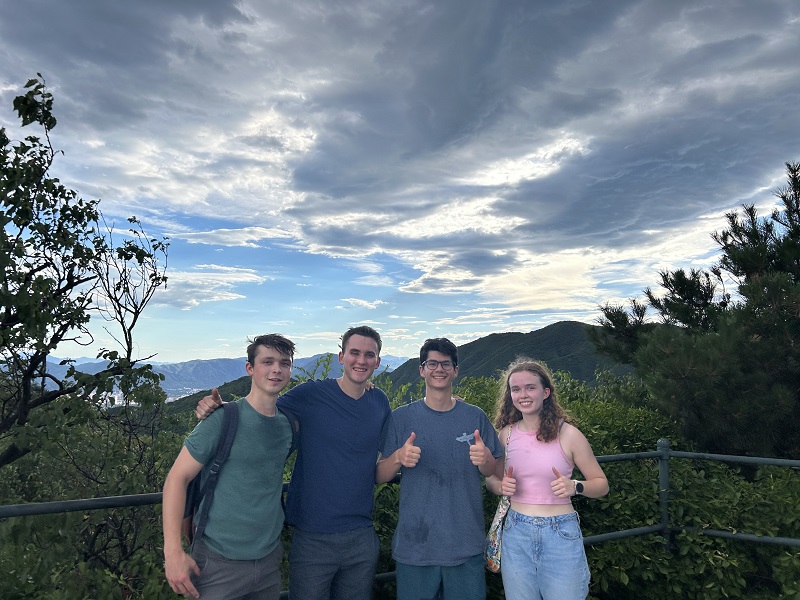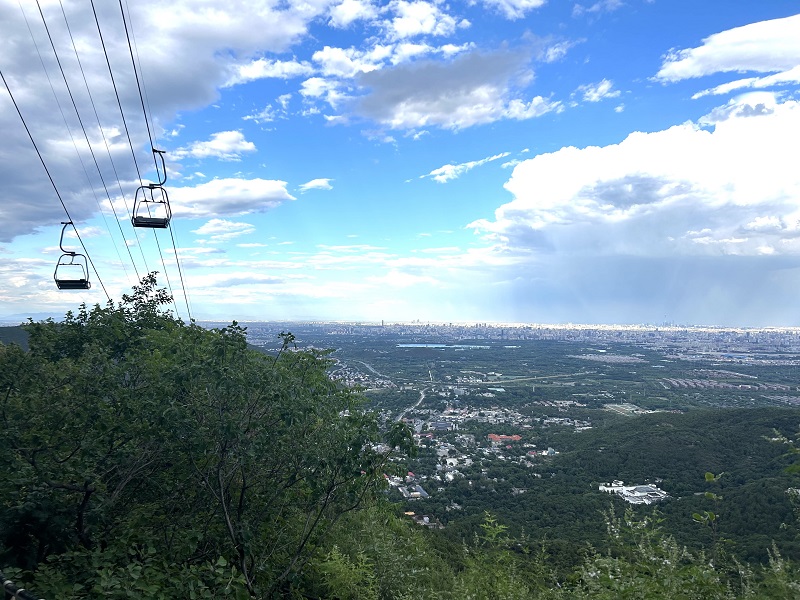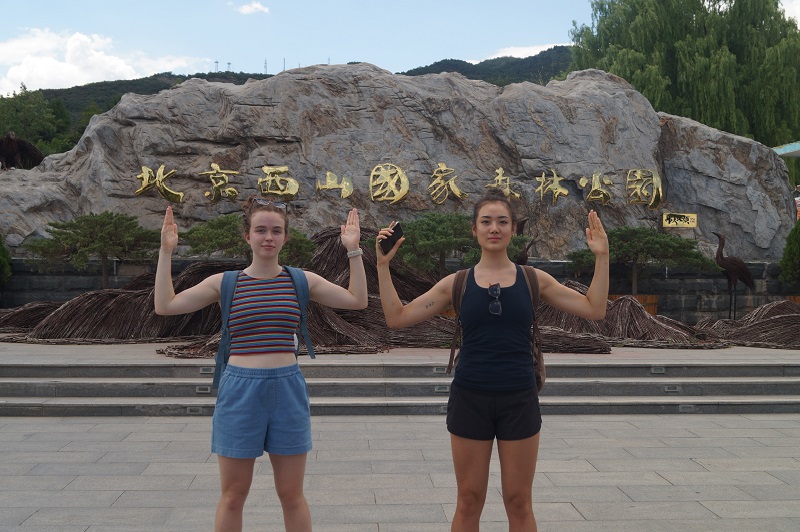Written by Laura Romig (Brown University), Student Correspondent for CET Beijing, Summer 2023
When a group of classmates and I first encountered Beijing’s beautiful natural landscape, it was by accident.
In Chinese, there is a word, 随便, with a long list of translations depending on its context—“casual,” “random,” “carelessly,” “to do as one pleases,” “to be free and easy”. 随便 carries both the negative and positive connotations of randomness, sometimes meaning careless, yes, but also sometimes implying spontaneous, and free.
At the moment in Beijing, tourist sites are booked full the moment tickets are released, and well-known museums teem with visitors searching for an air-conditioned oasis. In our efforts to see the city in the time before we return to the US, one solution my classmates and I have concocted could be aptly described by this word, 随便. The steps are as follows: get on the subway, pick a destination stop essentially at random, take the train to that stop, and then get off there to see what we can find.
Last week, for example, intrigued by a spread of green hills on the map, a few classmates and I rode one subway line out to that last, and aptly named, stop, 香山, or “Fragrant Hills”. Just beyond the subway station, we discovered a small neighborhood of homes and shops, nestled below a chain of dense, deep-green mountains. A thin, serpentine road uncurled uphill to the base of one of the mountains. As we walked, I saw shop doors flung open right onto the street—an art studio stacked with frames and wall hangings, a noodle shop with tables spilling outward, and a bookshop with a shared reading space in the back.

My classmates and I (not dressed for a hike) at the top of 香山 after spontaneously deciding to climb the mountain on a Friday afternoon
From afar, the mountainous hills around Beijing ripple with seemingly endless lush forest, dark and deciduous and impenetrable. Up close, at the top of that winding road, we found access to a hiking path that cut through the greenery and was dotted with seemingly miraculous temples and other constructions on the slopes all the way to the peak, crowned with an ancient-looking building that gazed over Beijing. Upon inspection of the inscription, we discovered it truly had been built in long-ago, unfathomable times—1983.
A gradual sloping path followed by narrow, steep stone stairs led us up to this peak. On the trail, the temperature dropped well below the 100 degrees Fahrenheit on the ground in Beijing city, which stretched out behind us as we walked. When I turned back, I could see the pinpoint needle of the CCTV tower, a short walk from our university. As I climbed step after step, nodding to fellow hikers and offering them a “加油” (“You can do it!” might be a good translation), I felt a hollow inside of me swell with a new fullness—from a careless subway ride, we had discovered the natural world in Beijing! And it was amazingly accessible. Nature, in Beijing, was the end of a subway line. It was a tiny brown grasshopper, perched on my classmate’s thumb. It was turning around, exhausted and sweaty, then leaning in amazement against the handrail to see all of the city sprawled, its massive buildings and lakes miniaturized to a scene I could cup between my two hands. It was temporarily losing the path among the trees. It was clear air, open skies, and the chirp of cicadas.

The view of Beijing from the Western Hills, with the Central Business District skyscrapers far in the distance
That mountain hike helped me realize what had been missing from my language classroom and city streets experience: a connection with nature. So the next day, I went out with another group of classmates, this time on the bus and with a plan, to 西山, another set of mountain trails in the Western Hills. As we bussed back out to the mountains, some of our fellow passengers, including the bus safety officer, struck up conversation with us, asking us about our impressions of China, our comparisons with America, our lives here, our lives back home. We chatted, rubbed sunscreen on our faces, and sipped at water before disembarking and setting out to climb the next mountain.

A classmate and I imitating the Chinese character for mountain, 山, at the base of ⻄山
Once I realized nature in Beijing was as close as the subway and bus lines, I started seeing connections with nature everywhere I looked. I thought about how 法源寺 (Fayuan Temple), the Buddhist temple tucked away in a Hutong that I had visited last week, was surrounded by and almost immersed in trees; it was built to exist within nature, rather than interrupting nature for the sake of human use. Branches had whispered with the breeze as we stepped between temple buildings, read the inscriptions in ancient Chinese, and tried to make connections between the ancient and modern writing systems. I imagined that some of the trees, the most solid and steady, had witnessed the careful carving of those original ancient characters. Now they watched us wander among them, visitors from across the world, studying the same language in its current form.
Beijing is also scattered with parks, several within a walk from our dorm. In summer months, the lotus flowers 荷花 and 莲花 begin to bloom, opening their fragrant petals for morning passerby before retreating at the rise of night. When my language partner Tang Hui had a free morning, she walked through a nearby park and snapped photos of the pink blossoms among wide green leaves dotting the lake, messaging me the pictures over WeChat. Later, as we were walking and saw a small lotus bloom on the university campus, she pointed out how the lotus root was the same food we had dropped in the boiling water at a Beijing hotpot joint the other week. The thread of nature, of course, trickled all the way down to the foods on our plates.
Even in our weekly CET-organized martial arts class, I found nature when I began to look. In my language class, where we study not only language topics but cultural ones as well, our teacher had given an introductory explanation of the Chinese religion and philosophy of Daoism. Its key principles, I learned, might be translated as inaction, accordance with nature, and spontaneity. These principles are expressed in various aspects of Chinese culture—for example, in the practice of 太极, Tai Chi. The martial arts we are learning, our instructor Li Ke has explained, is similar to Tai Chi; we move in accordance with nature, with purpose, but also while letting the natural flow of the movement lead us forward. We incorporate fans into the routine, which, after practicing a few times, almost seem to open and close on their own, in accordance with the sense behind the movements. So even in the shadow of the bleachers, on the sun-browned university track practicing martial arts, I realized there was a glimmer of the natural world for me to connect with.

CET classmates and language partners practicing martial arts together
Our language classes teach us vocabulary for communicating with native speakers, for debating solutions for US-China relations; our teachers show us how to write formally in Chinese and read news about green finance and international policy. They’ve also taught us about traditional Beijing culture and architecture, the influences of Confucianism on the education system and family structures, and much more. However, the experience of studying abroad in Beijing, experiencing the language in real-time and in connection with my body and mind, is what I believe has truly made a difference in my learning Chinese. The carefully planned class sessions build us a rigorous structure, a framework for the language that is immensely helpful. But it is the real-life experiences that sow life within this framework and allow us to actually live within the language.
The type of experience I’m describing—spontaneous, moving freely through the world—could be described as 随便, as random and possibly careless. But it could also be described as moving in accordance with the nature of the place you are studying, the flow of its language, and maybe even in accordance with the natural world. As we were hiking up that first mountain, chatting in Mandarin over the rush of the wind, I realized where such experiences could lead me. I also realized how far I still have to go in filling in that framework of living in another language. But—just like the Beijing hills I’ve hiked so far—that is a mountain I am excited to climb.